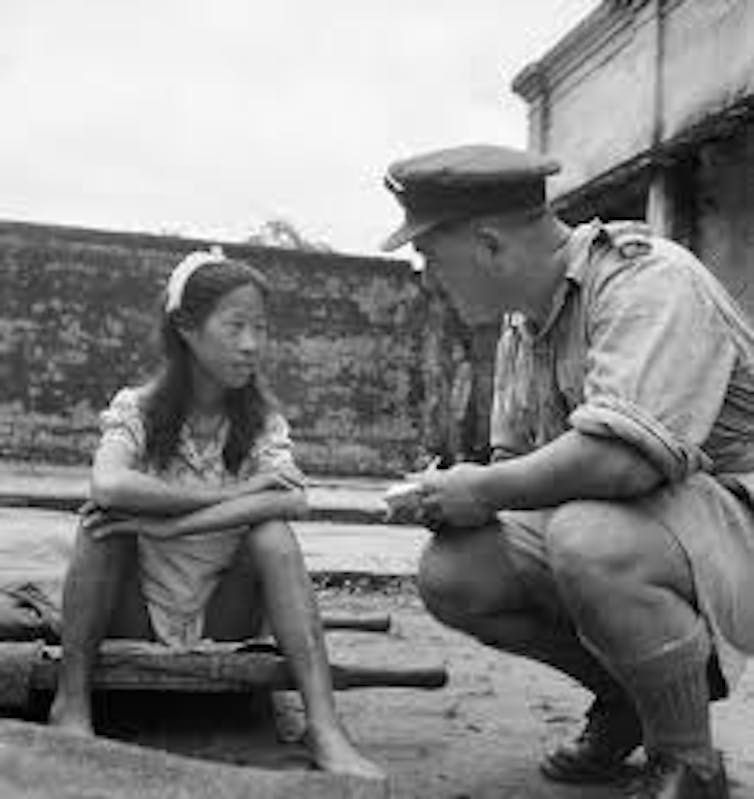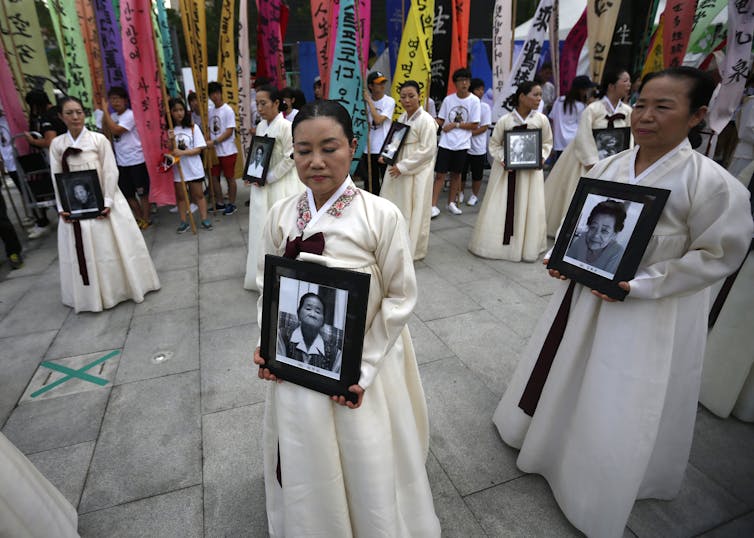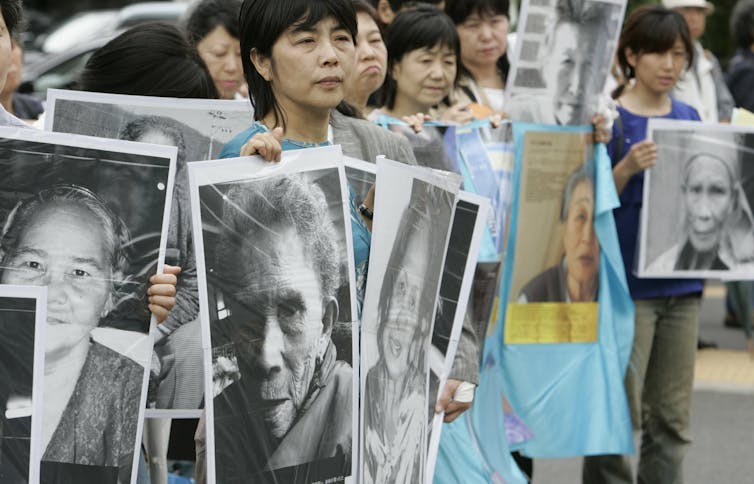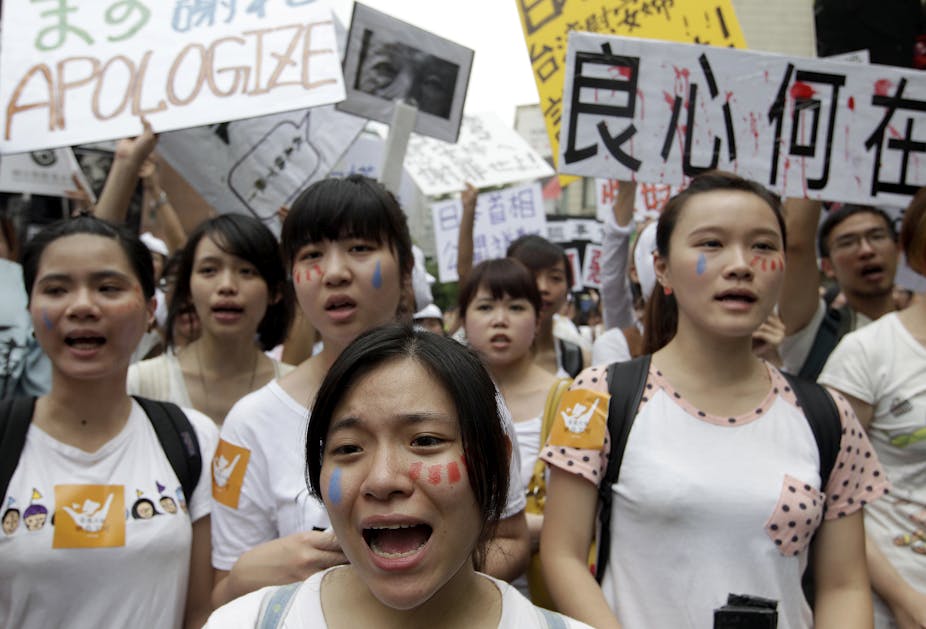In 1943, during the height of World War II, fifteen-year-old Liu Mianhuan was tied up and taken away by Imperial Japanese troops from her village in Yu County, Shanxi Province, China.
She was confined to a cramped cave dwelling near the Japanese military stronghold in Jingui Village as one of the troops’ “comfort women.” Japanese soldiers raped her during daylight hours and a military officer took his turn at night.
The torture injured the teenager so badly that before long, her entire body swelled. “The pain was so excruciating that I could neither sit nor stand.” Liu recalled when she spoke with me decades later, “When I needed to go to the latrine I had to crawl on the ground…I wanted to die.”
Liu’s account is typical of Chinese comfort women’s wartime experiences and similar to the ordeal of other women forcibly drafted from Japanese-occupied areas in the Asia Pacific between 1931-1945.
The Japanese government, however, continues to deny imperial Japan’s responsibility for forcing the women into sex slavery during this period.
A series of denials in 2014
This past fall, a renewed campaign of denial began after a major Japanese newspaper Asahi Shimbun retracted a series of articles on “comfort women.”
These articles, most published in the 1990s, cited the memoir of Seiji Yoshida, a former Japanese soldier. Yoshida wrote that he had participated in forcibly drafting comfort women on the Korean island of Jeju, but his story was later discredited, and has not been used by the scholarly community in studying the comfort women system since.
The current campaign of denial does not focus on factual errors of journalism, but on international criticism of Japan’s wartime wrongdoing.
Pushing back against international critics
On October 14, 2014, a Japanese Foreign Ministry official was sent to New York requesting that Radhika Coomaraswamy, a former United Nations Special Rapporteur, revise her 1996 report on imperial Japan’s forceful recruitment of sex slaves.
Activists and conservative media outlets from Japan have also sought to discredit a 2007 US House of Representatives Resolution that urged Japan to “formally acknowledge and apologize in a clear and unequivocal manner.”
Recently the Japanese government even went so far as to request a major American publisher, McGraw-Hill,to edit passages on comfort women in its history textbook.

The voices of denial in Japan insist that no objective evidence exists to prove the forcible abduction of women by the Japanese military.
I learned otherwise while researching a new book on the subject and interviewing women who survived such sexual exploitation.
Chinese testimony
The twelve survivors whose stories recorded in our book were all detained by force to be the Japanese military comfort women when their hometown was occupied.
Zhu Qiaomei,for example, owned a small restaurant on Chongming Island near Shanghai when Japanese army came in the spring of 1938. The soldiers forced her to service the troops as a comfort woman from home. Outraged, her husband joined the local resistance force to fight, but was caught and beaten to death. The sexual assault against Zhu Qiaomei and other women in the town continued until the Japanese army left the region in 1939.
Many have stepped forward to give similar testimony, yet the Japanese government insists that there is no evidence of abducting women by force.
Because the Imperial Forces destroyed incriminating documents at the war’s end, the international community has reason to ask: in re-constructing the facts of war trauma, who can claim the legitimacy of objectivity? Whose words count?

There is ample evidence to show that the sexual violence committed against women under the umbrella of the comfort women system took place across all battle zones and areas occupied by Japan during the Asia-Pacific war.
Investigations in China suggest that in addition to the comfort women drafted from Korea, Japan, and other regions from the early 1930s to 1945, approximately 200,000 women were drafted from mainland China by Imperial Japanese Forces.
The great majority, as in the cases of Liu Mianhuan and Zhu Qiaomei, were abducted from their homes and enslaved in the improvised “comfort facilities.”
Owning up to the past
What is equally disturbing about the rhetoric of denial is the claim that historical facts somehow inflict damage on Japan’s honor.
For the majority of Japanese and the rest of us around the world, recognizing comfort women’s sufferings is not done to disgrace contemporary Japan, just as commemorating the victims of the Holocaust and the atomic bomb does not disgrace Germany and the United States. Quite the contrary.
Taking responsibility to recognize and rectify past wrongs could greatly help Japan gain trust and respect from the international community.
This happened, for example, when a US Congressional investigation led to the 1988 American apology for and restitution made to Japanese-Americans wrongly interned during World War II. Far from damaging US honor, this step to remedy an historic wartime wrong was widely welcomed.

Japanese nationalist rhetoric has portrayed the issue of comfort women as realpolitik. Even our book documenting Chinese comfort women’s sufferings has been described by a Japanese politician as China’s attempt to start a comfort women battle in the US.
Ironically, research about the history of comfort women in China was inspired by a grassroots movement in Japan to provide humanitarian support to the victims.
In Japan – despite nationalist denials for seventy years since the war – citizen groups, researchers, lawyers, intellectuals, and lawmakers have worked diligently to redress imperial Japan’s wartime wrongs. Their actions reflect the honor of humanity and have won them international respect.
My own research on this issue was inspired by a Vassar College student’s senior thesis whose concern for the suffering of exploited women in distant countries exemplifies the best approach to resolving the comfort women issue: let humanitarian principles guide our actions and attitudes.
It is through compassion – in Japan and abroad – that East Asia will be able to move beyond the current tensions and political stalemate toward true reconciliation.

